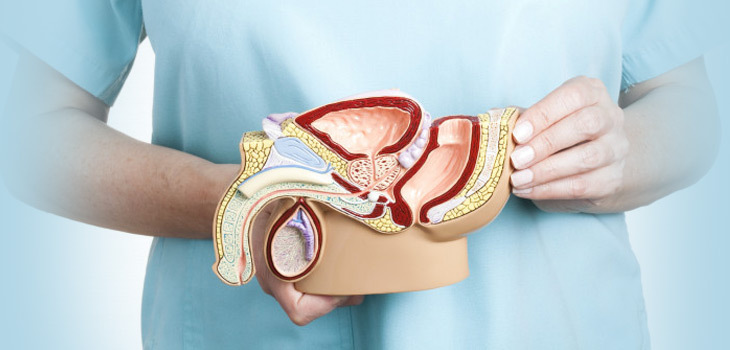What is a Prostate Cancer?
Prostate cancer is cancer that grows in the prostate gland, a small gland located between the penis and the bladder of men, it is a part of the male reproductive system.
The prostate gland is responsible for many functions in the body such as:
- Create fluid for transporting and nourishing sperm.
- Secrete Prostate-Specific Antigen (PSA) protein to help semen preserve its fluid state.
- Help support the bladder in controlling urine.
Cancer of the prostate gland generally grows very slowly and mostly affects men at an older age. Although aggressive growth of prostate cancer cells is possible, it occurs very rarely and spreads throughout the body.
This disease usually progresses slowly and effects are not immediately visible, most patients realize they have prostate cancer at a later stage, thus this it is also the leading type of cancer that causes death in men. Therefore, the sooner the tumor for the prostate is found and removed the better the chances of successful curative treatment with lower side effects.
Causes of Prostate Cancer
Similar to other types of cancer, the precise cause of prostate cancer is unknown. It has only been deduced based on assumptions made by observing similar traits and patterns in patients with prostate cancer. These factors include:
- Genetic mutations.
- Severe exposure to chemicals or radiation.
- Dietary habits
- Advanced Age
- Hereditary disease or family history with cancer
- Obesity
- Sedentary lifestyle
- Smoking
Although it isn’t necessary for people with the above-given traits to get prostate cancer, however, their risk of getting the disease is greater, thus a regular check-up can help them prevent cancer from developing at an early stage if they do get prostate cancer.
Symptoms of Prostate Cancer
During the early stages of Prostate Cancer, no visible symptoms can be detected, however, getting regular screening or health check-ups can indicate signs of cancer.
Such tests include measurement of PSA levels in the blood and Digital Rectal Exam (DRE), etc.
Following are a few of the symptoms that men with prostate cancer experience:
- Trouble beginning and controlling urination
- A constant urge to urinate, particularly during the night
- Discharging blood in urine or semen
- Experiencing pain when urinating
- Experiencing pain when ejaculating sperm
- Problem getting or sustaining an erection
- An enlarged prostate causes difficulty to sit.
In cases, when prostate cancer reaches a later stage, the patient experiences additional symptoms such as:
- Fractures or pain bone, notably in the parts such as the shoulders, hips, or the thigh
- Swelling or Edema on feet or the legs
- weight loss
- Fatigue or tiredness
- Disorder in bowel habits
- Pain in the lower back
Stages of Prostate Cancer
The following are the different stages in which prostate cancer progresses:
- Stage I: The cancer cells are localized and small, it is still contained in the prostate gland.
- Stage II: The cancer cells have spread much more, but are still confined inside the prostate gland.
- Stage III: The cancer cells have gradually spread to the outer section of the prostate gland and reaching the seminal vesicles close by.
- Stage IV: The cancer cells have spread to the lymph nodes, organs & tissues nearby like the bladder or rectum, or to further away parts like the lungs or bones.
Less aggressive prostate cancers sometimes do not progress beyond stage I, II, or III. However, aggressive cancer usually leads to the development of prostate cancers stage IV.
Treatment of Prostate Cancer
Prostate cancer treatment is based on the stage of the spread of cancer and other factors.
Prostate Cancer at an Early Stage
In this stage, the cancer cells haven’t spread much and are more localized. The following are a few of the treatment options usually provided by doctors during early-stage cancer:
Monitoring the Disease
When the spread of the disease is too early, it is not advisable to take immediate actions as the side effects caused by treatment aren’t worth the effort. During this phase, the doctors regularly measure PSA levels in the blood to decide the right opportunity to start the treatment.
Surgical Removal
Prostatectomy is done to remove the prostate gland via open surgery or laparoscopy.
Radiation Therapy
There are two types of radiation therapy presently available:
Brachytherapy
Radioactive seeds are implanted into the prostate to provide targeted radiation treatment.
Conformal Radiation Therapy
Prostate cancer cells are targeted with beams of radiation of variable intensity, image-guided radiation therapy. This procedure causes the least damage to healthy tissues from other available radiation therapy methods.

Prostate Cancer at an Advanced Stage
Prostate cancer during the advanced stage spreads throughout the body. There are also chances of remission after prior treatment. Then following are a few of the options provided by doctors for treatment:
Chemotherapy
This procedure is used to destroy the rapidly-growing cancer cells all over the body and most commonly used procedure for the treatment of aggressive prostate cancer. An intravenous line is used to deliver cancer medicine to the body in a series of treatments spanning numerous months. This procedure has a lot of side effects as chemotherapy destroys many rapidly growing normal cells such as mucosal cells, hair cells, cells of the gastrointestinal tract, etc.
Cryotherapy
This procedure involves freezing cancer cells to destroy them. The frozen cells die out once body temperature becomes normal again. This method is one of the non-invasive methods for cancer treatment but it is still in the experimental stage at the moment. However, the drawbacks of this procedure include erectile dysfunction as freezing the prostate can cause nerve damage to that section of the body which is necessary for controlling erection.
Hormone Therapy
This procedure involves injecting hormones to slow the rapidly spreading aggressive cancer cells in the prostate gland. Hormone therapy does not destroy the cancer cells but controls its level of spread by blocking or lowering the production of cancer cells. This reduces the symptoms of prostate cancer, however, causes side effects such as impotence, growth of breast tissue, weight gain, etc.
Prevention
Although these methods may not guarantee the prevention of getting prostate cancer, the following few of the methods given below are known to effectively reduce the risk factor for getting prostate cancer:
- Having a diet with an adequate number of fruits and vegetables
- Choosing to eat food for nutrition than health supplements
- Regularly exercising for the greater part of the week
- Controlling body weight
- Regular screening and consultation with the doctor

Conclusion
Males who are at a higher risk of getting prostate cancer are advised for getting screening tests at regular intervals. If diagnosed with prostate cancer, then the patients should pay attention to their physician’s advice and arrive for medication and follow-up visits without fail to make the treatment procedure successful.

